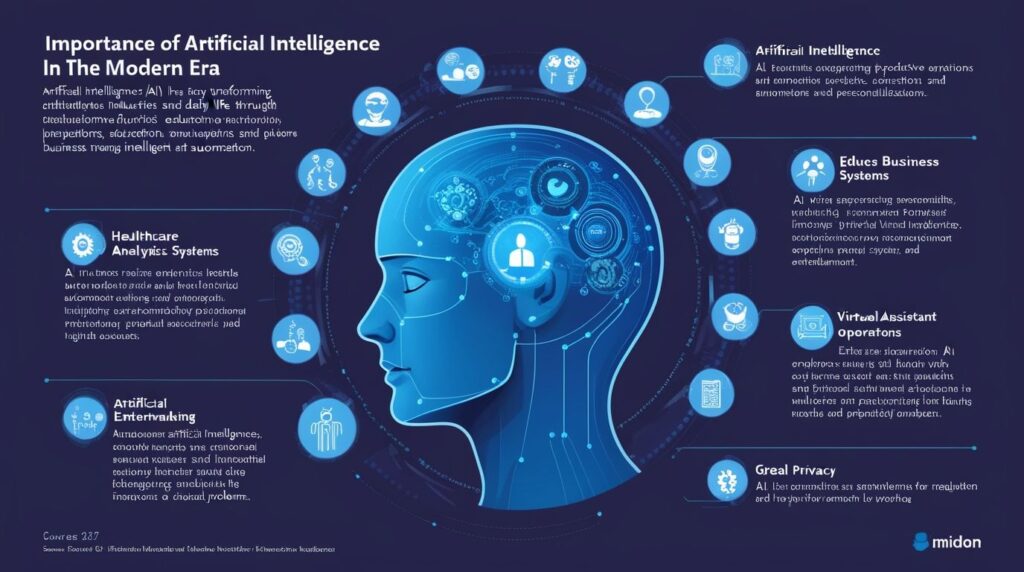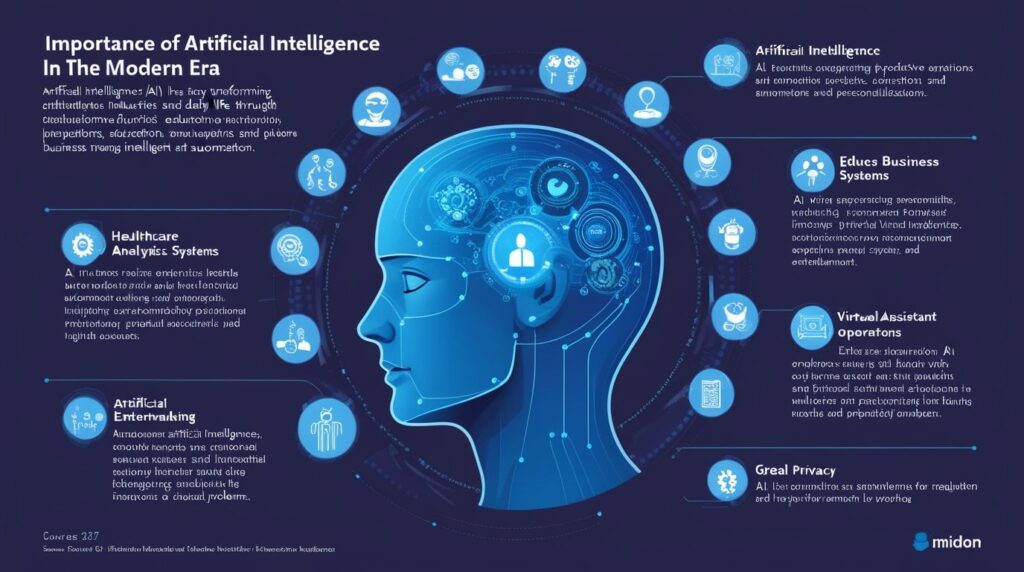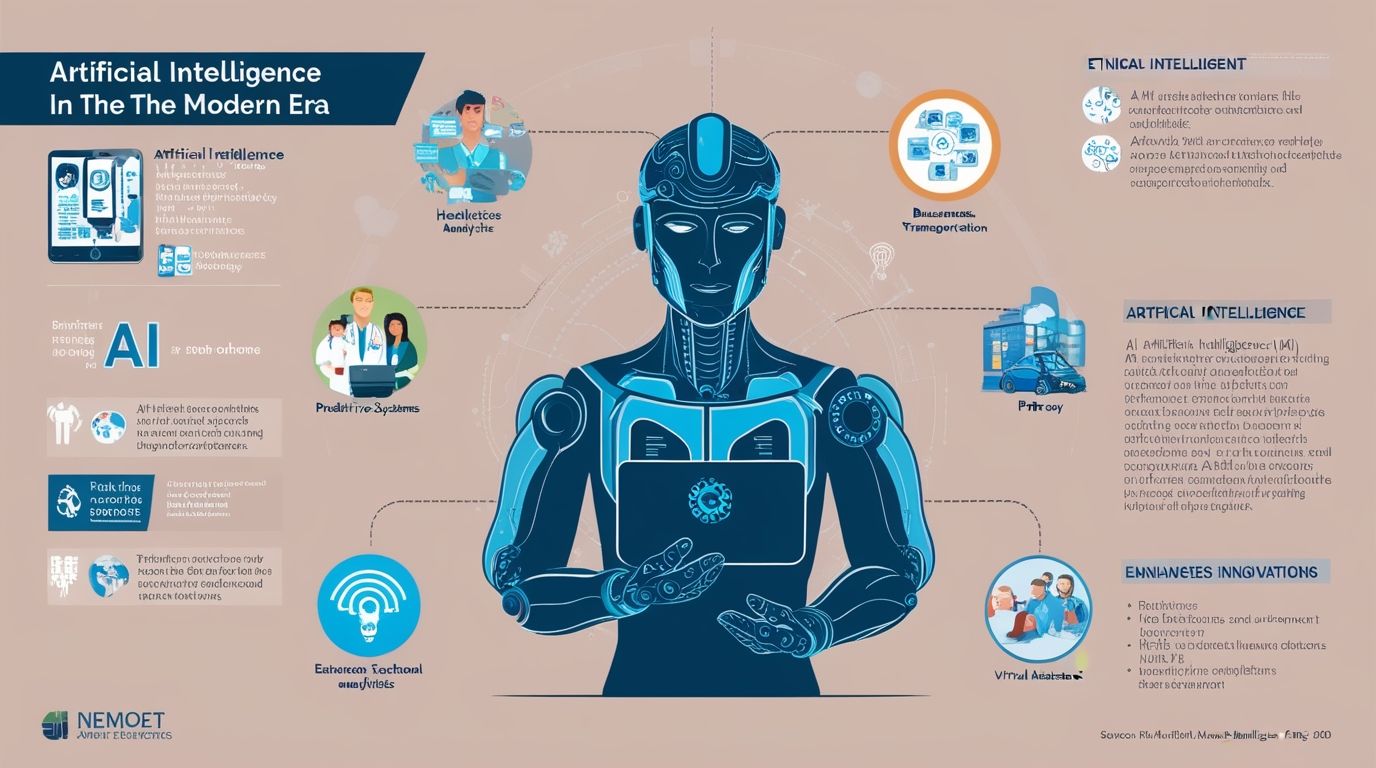Introduction
Importance of Artificial Intelligence in the Modern Era, Artificial Intelligence (AI) has emerged as one of the most transformative technologies of the modern era. From automating routine tasks to enabling advanced data analysis, AI has revolutionized industries and reshaped human interactions. This article explores the importance of AI, its applications, and its profound impact on society.
Understanding Artificial Intelligence
AI refers to the simulation of human intelligence by machines. It encompasses machine learning, natural language processing, robotics, and computer vision. AI systems can analyze data, identify patterns, make predictions, and solve problems autonomously. The core goal of AI is to create systems that can mimic cognitive functions such as learning, reasoning, and problem-solving.
Historical Development of AI
AI’s journey began in the mid-20th century with the invention of the Turing Test by Alan Turing, which assessed a machine’s ability to exhibit intelligent behavior. Since then, AI has evolved significantly, with milestones such as expert systems in the 1980s and deep learning breakthroughs in the 2010s. Modern AI systems leverage big data and advanced algorithms, enabling sophisticated applications in various sectors.

Applications of AI in Modern Life
- Healthcare
AI is transforming healthcare through predictive analytics, diagnostics, and personalized medicine. Machine learning algorithms analyze patient data to detect diseases early, such as cancer or heart conditions. AI-powered robots assist in surgeries, and chatbots provide virtual health consultations. Additionally, AI speeds up drug discovery and development. - Education
AI enhances learning experiences by providing personalized content and intelligent tutoring systems. Adaptive learning platforms adjust to students’ needs, ensuring better understanding and retention. AI also automates administrative tasks, allowing educators to focus on teaching. - Business and Finance
AI optimizes operations, improves decision-making, and enhances customer experiences in businesses. Chatbots handle customer queries, while AI tools analyze market trends and recommend strategies. In finance, AI detects fraudulent activities, predicts market movements, and manages investments. - Transportation
AI is central to autonomous vehicles and smart traffic management systems. Self-driving cars use AI algorithms to navigate roads safely, while smart sensors optimize traffic flow, reducing congestion and accidents. - Entertainment
AI personalizes content recommendations on streaming platforms and powers realistic video game graphics. It also aids in content creation, voice recognition, and music composition. - Manufacturing
AI-driven robots perform complex tasks with precision, boosting productivity and reducing errors. Predictive maintenance powered by AI minimizes equipment downtime, ensuring smooth operations. - Communication and Social Media
AI algorithms curate news feeds, suggest connections, and filter spam messages. It also enables voice assistants like Siri and Alexa, enhancing human-computer interaction.
AI and Data Analytics
AI’s ability to process vast amounts of data in real-time has revolutionized data analytics. It extracts insights, identifies trends, and supports data-driven decisions. For instance, AI in marketing predicts consumer behavior, enabling targeted advertising and improving customer engagement.
Ethical and Social Implications of AI
Despite its benefits, AI raises ethical and social concerns:
- Job Displacement: Automation may lead to job losses, especially in repetitive tasks.
- Bias and Discrimination: AI systems can reflect biases in training data, leading to unfair outcomes.
- Privacy Concerns: AI’s reliance on data collection poses risks to individual privacy.
- Accountability: Determining responsibility for AI decisions, especially in critical areas like healthcare or autonomous driving, remains challenging.

AI in Governance and Policy Making
Governments leverage AI for smart governance, data management, and public service delivery. AI systems predict crime patterns, optimize resource allocation, and streamline administrative processes. However, policymakers must regulate AI to ensure fairness, accountability, and transparency.
The Future of AI
The future of AI promises even more advancements, including:
- General AI: Systems capable of performing any intellectual task like humans.
- AI Ethics Frameworks: Regulations to address ethical challenges.
- Human-AI Collaboration: Enhanced integration of AI into human workflows.
- AI in Sustainability: Applications in environmental protection, renewable energy, and climate change mitigation.
Conclusion
AI is undeniably a cornerstone of modern technological progress. It improves efficiency, drives innovation, and enhances decision-making across sectors. However, its adoption must be accompanied by ethical considerations and robust regulations to mitigate risks. As AI continues to evolve, its role in shaping the future will only grow, making it a vital tool for addressing global challenges and improving quality of life.

10 thoughts on “Importance of Artificial Intelligence in the Modern Era”
Comments are closed.